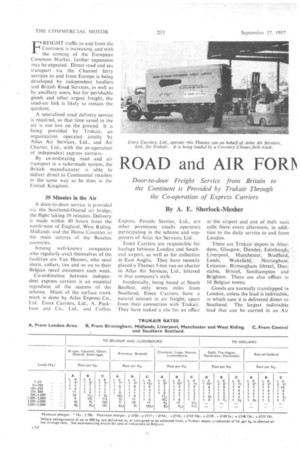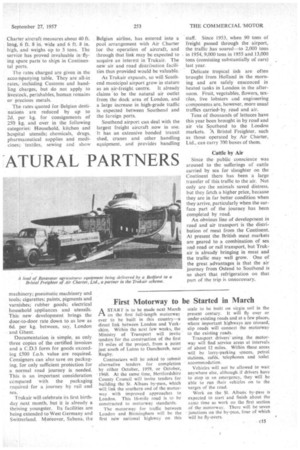ROAD and AIR FORTS ATURAL PARTNERS
Page 52

Page 53

If you've noticed an error in this article please click here to report it so we can fix it.
Door-to-door Freight Service from Britain to the Continent is Provided by Trukair Through the Co-operation of Express Carriers By A. E. Sherlock-Mesher
FREIG HT traffic to and from the Continent is increasing, and with the coming of the European Common Market, further expansion may be expected. Direct road and sea transport via the Channel ferry services to and from Europe is being developed by independent hauliers and British Road Services, as well as by ancillary users, but for perishable goods and other urgent freight, the road-air link is likely to remain the quickest.
A specialized road delivery service is required, so that time saved in the air is not lost on the ground. It is being provided by Trukair, an Organization operated jointly by Atlas Air Services, Ltd., and Air Charter, Ltd.. with the co-operation of independent express carriers.
By co-ordinating road and air transport in a tailormade system, the British manufacturer is able to deliver direct to Continental retailers in the same way as he does in the United Kingdom.
39 Minutes in the Air A door-to-door service is provided via the Southend-Ostend air bridge, the flight taking 39 minutes. Delivery is made within 40 hours from the north-west of England, West Riding, Midlands and the Home Counties to the main centres of the Benelux countries.
Among well-known companies who regularly avail themselves of the facilities are Van Heusen, who send shirts, collars, ties and so on to their Belgian retail customers each week.
Co-ordination between independent express carriers is an essential ingredient of the success of the scheme. Much of the surface trunk work is done by Atlas Express Co., Ltd. Essex Carriers, Ltd., A. Packham and Co.. Ltd., and Collins
Express Parcels Service,. Ltd., are other prominent smalls operators patticipating in the scheme and supporters of Atlas Air Services, Ltd.
Essex Carriers are responsible for haulage betWeen London and Southend airport, as well as for collection in East Anglia. They have recently placed a Thames 5-ton van on charter to Atlas Air Services, Ltd.. lettered in that company's style.
Incidentally, being based at South Benfleet, only seven miles from Southend, Essex Carriers have a natural interest in air freight, apart from their connection with Trukair. They have staked a site for an office at the airport and one of their vans calls there every afternoon, in addition to the daily service to and from London.
There are Trukair depots in Aberdeen, Glasgow, Dundee, Edinburgh, Liverpool, Manchester, Bradford, Leeds, Wakefield, Nottingham, Leicester, Birmingham (three), Dunstable, Bristol, Southampton and Brighton. There are also offices in 10 Belgian towns.
Goods are normally transhipped in London, unless the load is indivisible, in which case it is delivered direct to Southend. The largest indivisible load that can be carried in an Air Charter aircraft measures about 40 ft. long, 6 ft. 8 in. wide and 6 ft. 8 in. high, and weighs up to 5 tons. The service has proved invaluable in.flying spare parts to ships in Continental ports.
The rates charged are given in the accolapanying table. They are all-in rates, including Customs and handling charges, but do not apply to livestock, perishables, human remains or precious metals.
The rates quoted for Belgian destinations are reduced by up to 2d. per kg. for consignments of 250 kg. and over in the following categories: Household, kitchen and hospital utensils; chemicals, drugs, pharmaceutical supplies and medicines;. textiles, sewing and show machinery; pneumatic machinery and tools; cigarettes; paints, pigments and varnishes; rubber goods; electrical household appliances and utensils. This new development brings the door-to-door rate down to as low as 6d. per kg. between, say, London and Ghent.
Documentation is simple, as only three copies of the certified invoices and a C.D.3 form for goods exceeding £500 f.o.b. value are required. Consigners can also save on packaging, for only sufficient protection for a normal road journey is needed. This is an important consideration compared with the packaging required for a journey bY rail and sea.
Trukair will celebrate its first birthday next month, but it is already a thriving youngster. Its facilities are being extended to West Germany and Switzerland. Moreover, Sabena, the
Belgian airline, has entered into a pool arrangement with Air Charter for the operation of aircraft, and through that link may be expected to acquire an interest in Trukair. The new air and road distribution facilities thus provided would be valuable.
As Trukair expands, so will Southend municipal airport grow in stature as an air-freight centre. It already claims to be the natural air outlet from the dock area of London, and a large increase in high-grade traffic is expected between Southend and the foreign ports.
Southend airport can deal with the largest freight aircraft now in use. It has an extensive bonded transit shed, cranes and other handling equipment. and Provides handling staff. Since 1953, when 90 tons of freight passed through the airport, the traffic has soared—to 2,000 tons in 1954, 9,000 tons in 1955 and 13,000 tons (consisting substantially of cars) last year.
Delicate tropical fish are often brought from Holland in the morning and are safely ensconced in heated tanks in London in the afternoon. Fruit, vegetables, flowers, textiles, live lobsters and engineering components are, however, more usual traffics carrie& by road and air.
Tens of thousands of lettuces have this year been brought in by road and air via Southend to the London markets. sA. Bristol Freighter, such as those operated by Air Charter, Ltd., can carry 700 boxes of them.
Cattle by Air Since the public conscience was aroused to the sufferings of cattle carried by sea for slaughter on the Continent there has been a large transfer of this traffic to the air. Not only are the animals saved distress, but they fetch a higher price, because they are in far better condition when they arrive, particularly when the surface part of the journey has been completed by road.
An obvious line of development in road and air transport is the distribution of meat from the Continent. At present the British meat markets are geared to a combination of sea and road or rail transport, but Trukair is already bringing in meat and the traffic may well grow. One of the great advantages is that the air journey from Ostend to Southend is so short that refrigeration on that part of the trip is unnecessary.












































































































